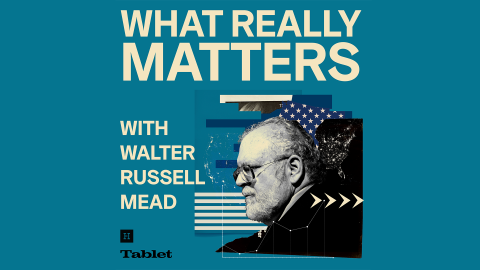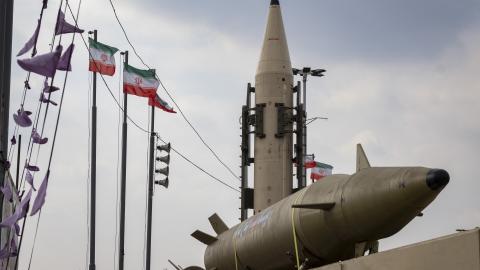
No Substitute for Victory: Mike Gallagher on Winning the Competition with China
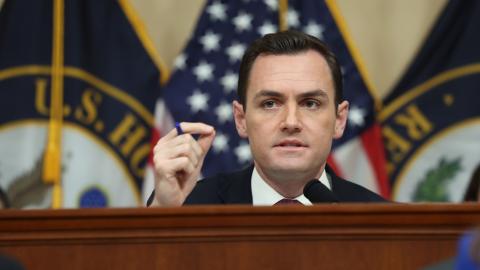
In-person attendance is by invitation only.
Event will also air live on this page.
Inquiries: press@hudson.org

Distinguished Fellow
Mike Gallagher is a distinguished fellow at Hudson Institute.

President and CEO
John P. Walters is president and chief executive officer of Hudson Institute.
In April, Congressman Mike Gallagher wrote in Foreign Affairs that “the [Chinese Communist Party] has no desire to coexist indefinitely with great powers that promote liberal values and thus represent a fundamental threat to its rule.”
Iran’s quest to destroy Israel, Russia’s brutal invasion of Ukraine, Venezuela’s menacing against its neighbors, and North Korea’s nuclear saber-rattling are all underwritten by China as part of the CCP’s plan to disintegrate the West and usher in a new, antidemocratic order with Beijing at its center.
Congressman Gallagher will sit down for a fireside chat with Hudson President and CEO John P. Walters to discuss China’s hegemonic ambitions, the new axis of aggressors, and the congressman’s work at the head of the House China committee.
Event Transcript
This transcription is automatically generated and edited lightly for accuracy. Please excuse any errors.
John Walters:
Welcome, those of you here in person, those of you who are here virtually. I’m John Walters, I’m president and CEO of Hudson Institute. I delighted today to welcome Chairman Gallagher to Hudson, and delighted to invite him in a new way as a friend and colleague now.
For those of you who don’t know, Congressman Gallagher represented Wisconsin’s Eighth District in the US House of Representatives from 2017 to 2024. He served for seven years on active duty with the United States Marine Corps, including two deployments to Iraq. He holds degrees from Princeton University, Georgetown University, the National Intelligence University, and a PhD from Georgetown. And yet, he has not been corrupted by our institutions of higher education.
In the 118th Congress, Mike Gallagher was Chairman of the Select Committee on Strategic Competition between the United States and the Chinese Communist Party. He’s also Chairman of the House Armed Services Subcommittee on Cyber, Information Technologies, and Innovation, and served on the Permanent Select Committee on Intelligence. From 2019 to 2021, he served as chairman of the Cyberspace Solarium Commission.
Today, we are happy to add to his resume that he has become a Hudson Institute distinguished fellow, and I’d like you to join me in welcoming him. In some ways, given the origin of Hudson Institute with Herman Kahn, given your resume, which I read, there was no other place for you than Hudson Institute with its technology, and national security background. Thank you for joining us and we’re honored to have you with us. Obviously, your work has been important and integral to our work for national security. In fact, of course, some of our colleagues have been involved with select committee and with you and your staff.
Let me begin, because of the obvious priority of the threat from China, with your work on the select committee. You already knew a lot about the threat, you read all kinds of intelligence reports. You’ve been working on this for a while, you know national security. But the committee went into great depth. And I guess, given that you started as an expert, I guess I’d ask you, as an expert, what surprised you about the work of the select committee?
Mike Gallagher:
Well, first of all, I just want to say what an honor it is to join the team here. And in a way, I sort of view this as a culmination of a conversation we started about 10 years ago when I was a newly unemployed ex member of the Walker for president campaign. And John and others at Hudson were, even then, when I was a nobody, willing to try and find a way to employ me so that I wouldn’t be wandering the streets of Green Bay begging people for money or just driving Uber for the rest of my life. So thank-you for that, and it’s just been a part of—
John Walters:
And this is a lesson for those of you that are young, in the value of tenaciousness. Sometimes you get second and third chances and you need to do that. So thank-you.
Mike Gallagher:
Or just be nice to people. You never know if they’re going to wind up having subpoena power in Congress. But it’s been great collaboration through my eight years in Congress, with all of your scholars. Many people on my team, I see here today, Patrick Cronin and others. And certainly on the Armed Service Committee, working with Bryan Clark and others. And I could not be more excited to dive into the fray here and contribute to that team, and so thank you for that. And I see my good friend and co-teacher, Aaron MacLean, who has also joined the team at Hudson. Aaron and I taught a course on the Korean War last summer. We’re teaching one on geopolitics and the work of Nicholas Spykman this summer. And Aaron’s been a fantastic friend and collaborator.
Funny story, I don’t think I’ve told this before, I might have told it on your podcast, Aaron. So we’re teaching this course on the Korean War, and it happened to be the 70th anniversary of the armistice agreement, and so there was a ceremony down at the Korean War Memorial. And like the war itself, the Korean War Memorial is often forgotten or overlooked for the Vietnam War Memorial and others. And so Aaron and I went to.
It was incredibly hot, we’re sweating. We made a last second decision to go down there. And one, there was no real representation from DOD, which I thought was a shame. But the keynote speaker, who was a senator, who shall remain nameless, just decided not to show up. And so Aaron and I were on the side, under the trees, seeking shade, and the organizers of the event saw us and then asked me if I could just give the keynote address. And initially I’m like, “There’s no way. I’m not prepared.” And then I thought, this is the one week in my entire life when I’m uniquely prepared to give an extemporaneous speech about the Korean War because I know everything about it for this brief five-day window. And so I did, and it was really a remarkable experience.
And to your question about what surprised me the most based on what I went into the committee’s work with, I think I myopically viewed US-China competition through the lens of military competition. I do tend to think that that’s the most important lens to put on. But in the committee’s work, I gained a respect not just for the economic and technological dimensions of the competition, but I would say the domestic aspect of the competition.
And starting with the first committee event we did, which was a rally outside the site of this illegal police station in downtown Manhattan, and extending to the engagements we did on a variety of campuses in the United States, with students who had been harassed and in some cases physically assaulted by members of innocuous sounding Chinese nonprofits that were really appendages of the CCP United Front Work Department. Extending to the investigation we did into an illegal biolab with Chinese ties in Reedley, California, where a local building inspector noticed weird things going on. And then all of a sudden found that there was hundreds of transgenic mice and Ebola and all sorts of other illicit pathogens inside this biolab in Reedley, California. I think I, prior to the committee, didn’t fully appreciate the domestic subversion and what I think could accurately be called an attempt to divide Americans against Americans, weaken our national self-confidence.
And if I could just step back and say one more thing. I first started to notice, a little bit prior to the committee, during the pandemic, everyone developed a pandemic hobby. Some people just drank a lot and others might have gotten into woodworking or something. My hobby was following all the CCP wolf warrior diplomats online and ingesting all of the propaganda, and watching the actual Wolf Warrior movies and the Korean War movie that China put out.
And that’s when I first started to really appreciate the ideological warfare that’s underway right now. And the way in which I do think the regime is trying to almost . . . I’ve called it sort of like a physician assisted suicide. Increase our isolation, increase our self-loathing, supply the chemicals in the form of deadly fentanyl. And so now what I’m trying to do is put all of that together in a more fulsome analysis that isn’t just military focused, but also appreciates the domestic competition that’s underway, if that makes sense.
John Walters:
Yeah. No, I think it is important. Before, with some of our work, I’ve been struck by how many things that we wouldn’t have thought of that the Chinese have weaponized. Not only the military dimensions, as you point out, but also things like international organizations that have regulatory power to punish their enemies and weaken our friends. And to the whole range and gambit of political, diplomatic, and information warfare. It is quite astounding. And that makes me ask, from the work of the committee, you put out a number of recommendations. Do you think we need institutional change in order to meet this foe, given the magnitude and the breadth of what has been driven at us as hostile actions?
Mike Gallagher:
In some ways I do. I’m hesitant to recommend the creation of a new department or additional layer of bureaucracy. Though in the cyber domain, one of the key recommendations that came out of my Cyberspace Solarium Commission, that I cochaired with Senator Angus King, was the creation of a National Cyber Director. And there, the thinking was because responsibility for defense in cyberspace is spread across DHS, DOD, and a variety of other agencies, there’s value in having what my good friend and co-chair Angus King called a single throat to choke. Someone who is Senate confirmed, who could be held accountable, almost in the form of a USTR-like position. And so we actually got that passed into law, and one of our commissioners, Chris Inglis, was the first National Cyber Director. So certainly in areas like that, I think there is institutional change underway.
I think the most important thing in the executive branch though . . . And I know we all can debate the right model for a president’s advisory system, and I’m sure the bookshelves in Hudson all contain copies of Peter Rodman’s famous book, Presidential Command, which I highly recommend. I think in the current moment, rather than a team of rivals, what is needed is a clear coherence on China policy. And I think there’s a fair criticism of the Trump administration, which on the one hand instituted the biggest change in US foreign policy since the end of the Cold War, and I think had largely the right approach to China. But on the other hand was divided, right? There was a more hawkish wing in the administration, there was a more dovish wing, usually that happens to be concentrated in Treasury. And I think that creates chaos and incoherence. So rather than creating a new agency or joint task force or this or that, I think the team that the next president has around him needs to all be directionally aligned on China.
And this relates to your first question. One of the biggest things that surprised me, not just in chairing the committee but in eight years in Congress, is just how powerful the status quo is, and how resistant to change the bureaucracy in all of these agencies are, as you know as well as anybody. And so the only thing that can overcome that inertia is presidential leadership and a team who’s actively working to implement the president’s agenda, and not trying to slow roll it or create end runs around it.
When it comes to Congress, I would submit that the creation of the select committee was the institutional change, and I would argue emphatically for the continuation of that committee in the next Congress. And I think we’ve proven, with passing the TikTok bill, that even a committee without clear legislative authority can still play a unique role in helping things get through the committees of jurisdiction that otherwise would’ve died were it not for the work of the select committee.
And then I would say, maybe surprisingly, and again this relates to your first question, the biggest areas where we need institutional change is at the state and local level. Because actually, the CCP has very sophisticated targeting of subnational governance structures here in America. We have attempts to influence and corrupt the Wisconsin State Legislature, certainly institutes of higher education, K through 12 education, and they’re just not as equipped to understand what they’re dealing with. And that’s where the federal government, I think, can be helpful in sharing knowledge and expertise. And it’s been hopeful, I think, to see so many governors . . . I was actually struck by how many governors reached out to me in the work of the committee, to ask what can we be doing at the state level to push back against CCP aggression.
John Walters:
Well, I want to ask you two things that your remarks prompt. One is Secretary Pompeo, our colleague-
Mike Gallagher:
I think he’s got a bright future in national security. Both him and Bill Barr, with a little bit more seasoning, I really think they can make an impact and serve at the highest level. So I look forward to helping them in the journey.
John Walters:
Sure. I’ll pass that along. But he’s talked about going to governors and to state legislatures and telling them, when he was secretary, that there’s a file on you. “We know there’s a file on you by the CCP, and they’re documenting,” and they’re being shocked. It is somewhat remarkable, when reading the reports of your committee, why isn’t the federal government informing Americans? Some of this is a kind of failure to keep the public trust, because there are things that Americans can do short of the national authorities to do things, and there’s been a kind of unwillingness to be frank about what’s happening.
Mike Gallagher:
Yeah. Well, first of all, I would commend the speech that Secretary Pompeo gave in Madison, Wisconsin, to the legislature. It’s one of the best speeches, I think, that’s been given in the last 10 years. And it was a perfect example of the type of outreach and information sharing that needs to be done. And I believe, Miles, you played a big role in that as well. And I can’t think of a . . . I mean, I guess the unfortunate reality is that’s the exception that proves the rule, which is that the DC national security bubble tends to think that this is the only thing that matters, what happens in this town. And us folks that live in flyover country, we rarely will get to see the professionals that live on Mountain Olympus.
So why is it? I think there’s sort of a need-to-know culture, right? I think the creation of my committee, when Kevin McCarthy set it up, it wasn’t just to serve as an accelerator for legislation related to China, it was to play a communications role, to explain why any of this matters to our colleagues, and by extension, the American people.
I mentioned our investigation into the illicit biolab in Reedley, California. There we had local officials who, through a mix of just diligence and a little bit of luck, stumbled upon something very dangerous happening, and then tried to contact federal officials repeatedly. And literally, the phone, they got hung up on when they tried to alert the federal officials and ask for help. They asked us to subpoena them so that they could get all the information into the record. And so I think that just proves, that shows what a problem we have in this space. Maybe it’s a bandwidth issue too, John. I don’t know. What’s the latest stat on how many investigations and how many man-hours the FBI I is devoting to CCP espionage related cases? It’s overwhelming in some cases.
And the final thing I’d say, I mentioned the CCP United Front Work Department. I think we struggle to understand, really, what that is. I think there’s a poor understanding of it because there’s no clear analog here in America, right? It’s this unique combination of traditional espionage work, economic coercion, and elite capture. And if I could connect it to a broader point, I think among the American people, there’s not the same recognition of the China threat because it hasn’t permeated our pop culture, right? In the way that in the old Cold War, every spy novel . . . Your average American knew what the KGB was, right? Your average American doesn’t know the various Chinese espionage agencies. And I think there, the silence, and I would argue corruption of Hollywood and corporate America, is playing a very negative role.
John Walters:
Good point. Excellent. I want to also ask you about TikTok. You mentioned TikTok in your earlier answer. And you were amazing in your diligence and your success here because there was a lot of pressure against you. What do you think is going to happen next? What do you think will be the outcome of some of . . . Obviously will be court challenges to the legislation. How do you see that proceeding?
Mike Gallagher:
Well, if I could just quickly tell a little bit of the story about how it got done because I think it reveals some interesting things about Congress. One is the attempt to force a divestiture, to force TikTok to separate from its Chinese parent company, ByteDance, had been tried and failed numerous times. I had a bipartisan, bicameral bill, the Anti-Social CCP Act, two years ago. That was actually an acronym, by the way. I was very proud of that being an acronym. That took a lot of time, my staff working on that.
John Walters:
Shocking amount of time.
Mike Gallagher:
Yeah, exactly. Probably not the best use of our time. But that failed. The attempts in the Senate, Mark Warner had a bill, the RESTRICT Act, which made meaningful progress. It got attacked from the right and left as giving too much authority to the executive branch, so that died. And quite honestly, there was a moment when we thought the entire effort was dead, in large part because there was a very intense lobbying campaign against it. I mean millions and millions of dollars were spent. TikTok was hiring sort of every lobbyist in town.
It wasn’t until October 7th that the effort was resurrected. And after October 7th . . . We had passed our final econ and technological report at the end of last year. And in that report, there was a recommendation to do something about foreign adversary controlled apps, but it was pretty vague. But after October 7th, I had Democrats on my committee coming to me, saying, “What’s going on with this? We need to take action,” as a result of seeing all the antisemitic content on the platform.
And so at that point, we had watched these various efforts failed, and then we worked with House leadership, and I think we did two things that were key to the success of the effort. One was we kept all of our negotiations private. We knew that if we introduced the bill and let it sit out there for months, it would just get lobbied to death and attacked. And we maintained pretty strict operational security as we went through a very complicated give and take between me and my ranking member, Raja Krishnamoorthi, and then the committee of jurisdiction, Energy and Commerce, which was Cathy McMorris Rodgers and Frank Pallone. And that was very difficult to do.
The second thing we did is I recognized that this thing wasn’t going to pass if Biden was threatening to veto it and convincing Democrats to vote against it. So we invited technical assistance from the White House and DOJ specifically. And both sides had to compromise. DOJ didn’t get everything they wanted, I didn’t get everything I wanted. But I think we arrived at a product that was stronger and we feel pretty confident can withstand legal scrutiny. And so then we had a pretty deliberate plan for we’re going to introduce, two days later the committee’s going to mark it up. The next week, we’re going to put it on the House floor. And we got an overwhelming vote.
And then the next big challenge I had to face was how do we actually force the Senate to swallow it? And there I have to commend the work of Senator Warner, Senator Rubio, and Senator Cantwell, who rather than rejecting the effort because it came from the House, and all of them had had their own constructs, were willing to work with us and realize that this was the moving vehicle and the best chance to get something done. And ultimately, we were able to convince Steve Scalise, who was critical, to put it on the National Security Supplemental. And it all happened. It was pretty remarkable. I’ve never seen anything like it in my many years in Congress. A lot of people played a key role in that effort.
So now what’s going to happen? There’s going to be a big legal fight over the whole thing. I think TikTok is already suing, they’ve released their legal analysis. But again, we feel pretty confident. We went through multiple iterations with the executive branch, that this is going to survive legal scrutiny. And I would say to anybody who likes to use the platform, anybody who’s invested in ByteDance, your user experience can continue and it can improve. You can make money off that investment as long as TikTok is willing to divest from CCP control. And that should be a common sense solution we all work towards.
And indeed, if TikTok wants to go public in America, which I assume would be the better outcome than going public in Hong Kong or somewhere else, it’s not going to happen under the current ownership structure. So the best possible outcome for everybody is the divestiture happens. The question is whether the Chinese Communist Party will allow it to happen, because the algorithm remains export control. And I would submit to you if they don’t, if they block it, that tells us something very fundamental about how they view the platform, which is not just a cool Chinese technology company that’s going to make a bunch of money, but is actually a platform for both espionage and propaganda use.
And I actually think it’s the second threat, the use of it as a propaganda platform, that’s the bigger threat. When TikTok has become the dominant news platform for most Americans under the age of 30, things start to get very concerning. We just would never have allowed the Soviets to control ABC, NBC, CNN. Well, CNN didn’t exist back then, right? CNN, they could have, I guess. Just kidding. And that’s just one part of the problem. And I’m sorry to go on.
Then, if you solve that problem, then we’re left dealing with the problem of social media in general and the corrosive impact it has on our kids. But that’s something we can solve later. We’re just trying to tackle the narrow issue of foreign adversary ownership of social media applications in America.
John Walters:
Letting the enemy fight information warfare in our own backyards, in our own living rooms. In some ways it should be easy, but the Communist Party in China spent a lot of time figuring out how to get around our resistance.
Mike Gallagher:
So there should be a DC-like update of the Clausewitzian maxim, of in DC, even the simplest thing is difficult. It was so difficult.
John Walters:
I want to make sure I get the title right because I want to ask you about . . . You coauthored an article with Matt Pottinger in Foreign Affairs, it’s gotten a lot of attention, entitled “No Substitute for Victory: America’s Competition with China Must Be Won, Not Managed.” This is an issue, I think, that applies certainly with regard to China, but also with regard to our other adversaries in Europe and the Middle East, the issue of victory versus management. And could you say briefly what you mean by management versus victory?
Mike Gallagher:
Well, this all starts with the testimony that Matt Pottinger gave before the select committee in our first hearing about a year and a half ago. And he said something that I’ve subsequently referred to as the Pottinger Paradox. And I’ve urged him to trademark this and make money off of the Pottinger Paradox, but I don’t know if he has. And Matt and I go way back, we served in the Marine Corps together. And so I was a Middle East guy and sought out Matt’s help when I came into Congress, to learn a little bit about the Indo-Pacific, enough to be dangerous.
But Matt made the argument that was persuasive to me in the hearing, that there’s sort of a paradox involved in dealing with Marxist-Leninist regimes. And for years, we sort of tried to convince ourselves that we weren’t in fact dealing with a Marxist-Leninist regime in China. But the more you try to accommodate them, the more aggressive they become, and therefore the best path to peace or deterrence is actually to be more candid and aggressive, not only in terms of military competition, but economic and ideological competition. And that’s the core point of disagreement. Most of the people taking issue with our article just have a fundamentally different view of how we can deal with China and reduce tensions with China. So just point one, the Pottinger paradox.
Point two: in the committee’s work, I was struck by a few things. One, there seemed to be an emerging consensus on the near-term goal or focus of US strategy, which was to prevent a war over Taiwan. Everyone agrees this is the most stressing national security challenge, and we need to figure it out. And you can throw Cronin and Clark in a room and give them a six-pack, and they’ll figure it out in an hour and we’ll just implement that strategy.
I would argue there’s also an emerging sense of what we need to do in the medium term, which is prevent China from controlling the commanding heights of critical technology. And reasonable people can argue about what is included under the banner of critical technology. But there seems to be no consensus over what is the long-term goal of our strategy.
And in a way, it seems like we’ve kind of reversed the order of how we did things in the old Cold War, right? In the old Cold War, some of the earliest documents started with the analysis of what the overall long-term goal of America’s strategy should be, which came to be called containment. But you can look at the Long Telegram, you can look at NSC 20-4, you can look at Eisenhower NSC 153-2. It all starts on that, and it’s pretty hard-nosed. And we also believed that there was a brittleness to the Soviet regime that would eventually collapse under the weight of its own contradictions, where in the present day we’re not even allowed to talk about such things. It’s sort of verboten.
And so Matt and I kind of wanted to push the envelope in talking about that. And so what does victory mean? Well, obviously in the short and medium term, it does mean convincing the regime that they cannot prevail in a hot or cold war with America. But we also think it means giving hope to people in China that they can have an alternative mode of governance that doesn’t rely on relentless repression at home or aggression abroad. We are emphatically not calling for forcible regime change, but we think our strategy is an extension of something that used to be an area of bipartisan consensus in the old Cold War, which is you had to tackle the internal sources of Soviet imperialism, and you can almost directly quote that from Reagan’s national security documents, if you wanted to have a chance of managing their external behavior, or at least you had to understand it.
The final thing I’d say is why this attempt to manage the competition, we think, is the wrong way to go about it, in addition to misunderstanding who we’re dealing with in the Chinese Communist Party, is that it undermines the urgency you need to galvanize the national security bureaucracy to in fact compete aggressively. Or let me say it more provocatively, to actually wage cold war in order to avoid a hot war. And if you’re trying to do this, well, we’re going to cooperate when it comes to AI and climate change, but then we’re going to occasionally kick them in the teeth on export controls, but we’re going to have a bunch of exemptions to licenses for Huawei equipment. It creates confusion, and as a result, we don’t actually attack the problem with the requisite alacrity and creativity you need in order to prevent World War III. And I think those are the stakes in no uncertain terms. So that’s what we’re trying to get at in the article.
John Walters:
I also was struck by that argument and the clarity of it. But also, work we’ve been trying to do. Mike Doran, who you know from long ago, and some of us, went to Israel in January and talked to people there. And we were struck by how much the situation partly was a result of thinking of deterrence as a defensive activity. That deterrence is really an offensive activity that you must continually not only push back or guard against the adversary, but you have to weaken the adversary’s ability to act. And there’s a tendency not to think that way because it seems to be a kind of, well, I’m provoking war. But the only way to have deterrence in the Taiwan Strait or in Europe is to make sure that the attempts to project power by your adversary are met, and met forcibly. Given my background, I can’t help but ask you about fentanyl.
Mike Gallagher:
Could I make one more point—
John Walters:
Yeah, for sure.
Mike Gallagher:
. . . on that though? I think you’re absolutely right, and if you just look at . . . I may have said this at Hudson before, forgive me. If you look at the previous three Taiwan Strait crises, look at what was necessary to in fact deter a much weaker People’s Liberation Army and Chinese Communist Party. Orders of magnitude weaker, right? In the first one, in the mid ‘50s, Eisenhower got, if memory serves . . . He went to Congress and actually got an advanced AUMF as part of threatening China. In the second one, he deployed Matador cruise missiles to Taiwan and mobilized massive amounts of air and naval power. In the third one, in the ‘90s, Clinton . . . That was the biggest display of American hard power since the Vietnam War. And that’s what it took in the previous three.
Logically, defusing the fourth Taiwan Strait crisis is probably going to require an even greater display of American hard power and presidential cojones, I don’t know if I’m not allowed to say that in polite society, than the previous three did. And so we need to wrap our head around that before it’s too late. I think there’s a Herman Kahn quote . . . Herman Kahn has now reached a point, like Bismarck or Einstein, where he gets quotes attributed to him that he probably didn’t say. But he said, “World War I . . . “ I was struck by this. I ran by the World War I memorial this morning, another forgotten memorial here in DC, it’s great. “World War I was due to an arms race. World War II was due to a lack of an arms race.”
And if we don’t rearm . . . And Pottinger and I lay out this three-part framework, rearm, reduce, recruit, for how we might win the Cold War. And we are after victory, if we don’t rearm, I feel we are aggressively, aggressively, I feel we’re going to stumble into a war for which we are ill-prepared, and for which it’s hard for us to conceive the costs in terms of blood and treasure. I’m sorry to be such a downer this morning.
John Walters:
Well, I was going to ask you about fentanyl. That’ll be—
Mike Gallagher:
Yeah, yeah. I’m happy to talk about that.
John Walters:
That’ll be a cheerful topic.
Mike Gallagher:
Yeah, that’s right.
John Walters:
Look, I was struck, as you know, by what you and your investigators found, which was there’s been a lot of talk about Chinese communist complicity in providing fentanyl, fentanyl precursors to Mexican cartels, money laundering. But that’s all been somewhat inferential, and there’s been a lot of he said, she said reductionism of that, even though I think that’s irresponsibly silly. But you found documentary proof that the Chinese communist government is financing and supporting this. They have clear knowledge of the suppliers and they’re trying to evolve it. Can you say a little bit about that? And can you say something about what you think the implications of that should be for American policy? Could you write some recommendations?
Mike Gallagher:
Absolutely. Well, first of all, I have to commend the phenomenal testimony that Bill Barr gave in front of our committee. Please, if there’s one thing you do after this, after reading my Foreign Affairs article, read Bill Barr’s testimony and his response to Q&A throughout that hearing. It’s just some of the best analysis of the situation. Bill Barr’s earned the right not to testify ever again if he wants to, but he was kind enough to do it because he felt so strongly about the issue. And to do it in front of . . . We had about 50 family members of victims of fentanyl overdoses there. It was just incredibly powerful.
The other massive shout out, because I did little than other than, a year ago, tell my staff, “Hey, we should do an investigation into fentanyl. Go forth.” And they came back with something amazing. My incredible investigative team led by Julissa Walsh, and then Matt Cronin, who’s just supremely talented, spent about a year going on various PRC websites using VPNs, covertly contacting precursor sellers online, and just started to compile all this proof.
And in the report that emerged, and I would urge you to read the full report, we lay out that the regime is subsidizing fentanyl precursor production. And most of the world’s precursors come from China, make no mistake about that, in really, three ways. There’re direct subsidies in the form of rebates for value-added tax. So they incentivize, you get a reward for exports of these precursors, which are disallowed within China. And actually, distributing in China is penalized by death, and there’s no medical use for these precursors worldwide, so they’re actually rewarding people for shipping them outside of China, primarily to the United States. They’re protecting the companies and the traffickers in various ways. They’ll tip them off when they get in the crosshairs of US and international law enforcement, for example. And they’re also just allowing the online commerce to happen in a system where they could easily crack down on the online commerce.
So for example, just in our analysis, we found over 30,000 instances of advertisements where literally, you go on these websites, they’ll say, “Hot opportunity in Mexico, guaranteed to evade customs and US law enforcement.” And this stuff is happening every single day, and killing over 200 Americans every day, which is like if a big commercial aircraft carrier just crashed every single day. That’s the scale of destruction. Upwards of 70,000 Americans killed last year. You know how many officially, in China, got killed? Zero.
And then if you pair our analysis with Barr’s testimony, what we have is a preponderance of evidence suggesting the regime is knowingly doing this and subsidizing an effort that’s killing Americans on the scale of the Vietnam War. And there’s no accountability for it. And far beyond that, we’re like Lucy and Charlie Brown with the football, where now we’re going to engage in another round of counter-narcotics cooperative talks with the CCP, hoping against all evidence that it’s going to change their behavior.
So instead of that, we recommend a few things. And this was a bipartisan investigation, by the way, and hats off to my incredible ranking member Raja Krishnamoorthi, I could not have asked for a better partner on all these issues. We recommend a more aggressive sanctions regime against the PRC companies that are behind this. Directly contradicting what I said earlier about creating new agencies, we recommend the creation of a counter-opioid joint task force. But the goal is to streamline the various players that you had to deal with in your previous life, and give them the requisite authorities. We recommend eliminating the de minimis loophole that allows a variety of things to be shipped directly into our country and evade customs inspection and enforcement. And then we recommend taking down and going after the PRC e-commerce websites that allow this to happen.
I would sort of put that as part of a broader capability that we need to develop. And this is something I actually don’t think that . . . Maybe Pottinger and I talk about it directly in our Foreign Affairs article. In the same way that we devoted at least a lot of rhetorical effort at the end of the old Cold War into tearing down the Berlin Wall, we should devote a lot of technical effort and time towards being able to tear down the great Chinese firewall when it suits America’s purposes. So that’s what our fentanyl investigation revealed.
John Walters:
I have to ask you, because we’ve talked about this, why do you think . . . I mean, I was saying to somebody the other day, what do you think would be the result if we, say, used a balloon to fly over China and drop fentanyl tablets? It would be seen as an act of war. The reaction, even to your report, has been, for me, shockingly muted. I know it’s not muted for the families, I know it’s not muted for people who, like yourself, understand what’s going on here. But we talk about replacement institutions, haven’t American institutions failed us here, basically at the national level? Why do you think that is?
Mike Gallagher:
I think there’s a pervasive fear. It gets back to, I think, the Pottinger paradox, the argument we laid out. There’s just this fear of provoking China. It pervades everything we do. And maybe that’s downstream of the very real economic leverage they have over us in key areas. Go back to the earliest days of the Fentanyl crisis . . . I mean the coronavirus pandemic, where they’re threatening to cut off the export of APIs and plunge us into a sea of coronavirus. But I just was struck by this with everything we did on the committee: the depth of resistance from Wall Street, from corporate America, and in some cases it’s from the White House, just because we’re so afraid of provoking the regime. And there just comes a point at which the fear of provocation is itself provocative, right? Insomuch as it prevents us from taking action.
And when you step back, this stuff is just crazy, the lack of accountability. Or even the pandemic itself, what’s the death toll now? Twenty-seven million worldwide. If, as seems likely, it not only came from a lab, but was altered in a lab, this would mark a development, I would argue, as significant as the advent of nuclear weapons in terms of the future of biological warfare. And yet, we’re just sort of shrugging our shoulders and saying, “Well, nothing to see here.” No accountability for the outbreak of the pandemic. It is maddening. And this is an unsatisfying conclusion to come to as a legislator. Well, I’m no longer a legislator, I’m just an unemployed bum.
John Walters:
You’re bigger than a legislator. You’re a citizen.
Mike Gallagher:
Oh, that’s right. That’s right. That is how the system works. Yes, remembering that. It’s a good thing I have my Declaration of Independence tie to remind me. In our system, on issues like this, it does require presidential leadership. It really does. It really does. And I think that’s something we’ve lacked on these issues.
John Walters:
Yeah, we’ve kind of taught the Chinese Communist Party that you can release a biological weapon and get away with it. You can release a chemical weapon and get away with it. You can conduct rampant information warfare in our own homes and get away with it. How is that not the opposite of deterrence? We’re kind of inviting our adversary to destroy us. As you said, assisted suicide. This is where your argument about victory versus management, I think, is it’s like we have to decide we’re going to stand up and say, “No, this is going to happen. We win, you lose.”
Mike Gallagher:
I wonder too if it ultimately rests, and we have some true experts here that can push back, on what our assessment of the CCP’s goals, midterm and longterm, are, right? If you believe they’re interested in a stable balance of power in the Indo-Pacific, that might lead you to one set of policy recommendations or a strategy. I don’t think that’s true, and I think their ambitions are global, and they, in some sense, present an existential threat to us.
But again, I’m just struck at the disparity between what you’re allowed to say in the present day and how we used to talk about this stuff in the old Cold War. What is the phrase? The core of the Long Telegram itself is a section where Kennan says something to the effect of, “We’re dealing with a political force fanatically committed to the belief that with the United States there can be no modus vivendi. That it is necessary and appropriate that our internal society be disrupted, that our traditional way of life be destroyed, and that our international authority be broken.”
I could make the argument that the CCP is interested in those same things, and believes there is no modus vivendi with the capitalist system led by America. And as Xi told Putin in their last meeting, they have a opportunity unseen in a century to remake the entire world order. And yet, so many Americans and experts cling to this belief that we can revive responsible stakeholder thinking, we can take the temperature down, and we can just manage the competition, and that’s the best path forward. I just think it’s the wrong . . . We have enough evidence, we have 25 years of evidence at least, to suggest that we need to at least experiment with a different approach. Let’s just start making original mistakes. That’s the path forward for America.
John Walters:
Well, we have a few minutes for some questions from our colleagues here in the audience, our guests. Yes, sir. There’ll be a microphone somewhere, I think. Right here. Thank you, Reece.
Robert Blohm:
Yeah, I’m Robert-
John Walters:
. . . please make it a question.
Robert Blohm:
Yeah, of course. Yeah.
John Walters:
We’ll do another event with you later.
Robert Blohm:
I’m Robert Blohm. I’m an economist. I’m a native-born US citizen, but also Canadian under free trade agreements, and I contribute to the Wall Street Journal regularly. I just wanted to follow up on your point and to get your comment on it, or at least to restate it. What I told Miles is that the CPC is benefiting from inertia, they’re making the most of it. When I mean by inertia, I said, “Look at the Chinese expert community here. They all have their contacts. The reason they don’t want any of this disturbed, they don’t want to disturb their whole network and so on.” But it’s the same thinking that permeates the Communist Party. It’s job protection. This is the greatest job protection program the world has ever seen in China, where you kill for job basically. In a sense, this mentality sort of permeates us, that yeah, you got to disturb things.
Now, we accept this when it comes to democracy. The reason they don’t like democracy is they can’t deal with uncertainty. They don’t like probabilities. Everything has to be deterministic, you have to have a job for life, everything has to be controlled, so we accept that. But in our daily business and our relationships, no, we want stability, we want to preserve our contacts. So this is what we’re up against. But we know this too: it permeates organizations. Even Stephen Kotkin said org theory, even organization theory explains this, within organizations and the politics, that occurs. Anyway, so I just wanted to bring that up based on your comment.
Mike Gallagher:
Can make some points based on that? I think part of the pushback about the argument that Matt and I have made, from the left, or at least Fareed Zakaria’s criticism has been . . . I don’t want to mischaracterize. Our strategy is unrealistic just because of China’s economic power and the level of economic entanglement we have with China. To that, I would say a couple of things. A, we think we’re overestimating right now, China’s economic power. And B, people forget that in the ‘70s at least, the CIA estimated the Soviet economy was 57 percent of America’s. And so right now, the analogous assessment of China would be 65 percent. So yes, we trade more with China than we ever did with the Soviet Union, but they had a variety of trading relationships. Now it is complicated and there is no cost-free way to selectively decouple from China, but that is what we must do.
The criticism from the right has been, “Well, we’re overextended and we just don’t have money to do a massive military buildup.” And to that, I would say we are . . . Me, I won’t speak for Matt because this isn’t part of the article. I am explicitly saying now is the time to choose guns over butter. And the idea that both political parties are unwilling to say we need to reform entitlements is absurd to me. And at some point we’re going to have to do that. I could imagine the next president having to navigate between the Scylla of a fourth Taiwan Strait crisis and the Charybdis of a debt crisis, and that is what is going to be necessary.
And so the hard choices aren’t necessarily going to be between within the Department of Defense, so there are reforms that could unleash a lot of free money, but between the things that are actually driving up our debt and our ability to make a generational investment in the hard power necessary to defuse a war. That would of course be far more costly than an extra 20 billion a year for long range anti-ship missiles and a bigger navy designed to frustrate the PLA’s ambitions.
John Walters:
Yeah, I would just add one thing from our colleague, John Lee, has written a number of years ago, was pointing out the Chinese Communist Party is decoupling from us and the rest of the world. So the argument here is, well, we can’t decouple. Well, that’s not what they think. That’s what made in China means, that’s what the systematic taking over and isolation is. If the phenomenon was impossible, then they wouldn’t be doing it, so it can’t be impossible.
Mike Gallagher:
The other thing, and Aaron’s work, I think, is critical on this, in all of our analysis we tend to do a bit of mirror imaging. And I always confront this in, I think, the financial community especially, where there’s a persistent argument that, well, you defense types are freaking out about a war over Taiwan. Xi Jinping’s a rational actor, he’s not going to do that, the cost would be so severe. I feel like that’s a profoundly western perspective.
And if you go back to the Korean War, these regimes are just far less sensitive to the costs in terms of blood and treasure than we are. We are far more casualty averse. So we look at such a conflict and think, oh my gosh, one aircraft carrier gets sunk, that’s 5,000 lives, there’s no way we could do that. Whereas even, I think, more center-left scholars like Oriana Mastro have made the argument that if you gave Xi Jinping a choice and said, “You can have Taiwan, but it’s going to cost you most or all of your Navy,” he would take that deal 10 times out of 10, just because the regime is . . . He’s preparing his country for war and preparing to suffer the costs entailed of achieving his lifelong ambition, which is reunification.
John Walters:
Also, I think the other thing that you pointed out earlier; in a certain way, China, Russia under Putin, Iran, they’re kind of looking at what we thought was the rules-based . . . What the rules were. You can’t do that, you can’t do that. And they’re saying, “Really, let’s push on that. Let’s push on what we can do. Let’s break the rules on trade. Let’s break the rules on information warfare. Let’s break the rules on chemical and biological weapons attacks.” And our response is, “Well, those rules don’t really exist.” What they’re finding is what we thought were kind of like the law of gravity, isn’t the law of gravity at all. Somebody has to enforce those rules, and you don’t enforce it, and that’s encouraging them to say, “Well, we can make the rules ourselves.” And that means a completely greater chaotic problem for us, and we’re having trouble coping with it.
Mike Gallagher:
I wanted to put it in gravitational terms. To the extent the rules-based international order exists, and there’s a gravitational pull. It’s because America is like the Sun in the solar system. China may be Jupiter, but we still have the hard power and economic power to enforce some semblance of a gravitational pull. I think they’re not content being Jupiter, and they would like to be the Sun in a entirely new orbit and eventually render us irrelevant on the world stage, and maybe get to be Pluto or something. Is that still a planet?
John Walters:
Depends on who you ask.
Robert Blohm:
That’s what they call the Three-Body Problem.
Mike Gallagher:
Oh, there we go. I got to watch that. Yeah, I read the first book. I didn’t think it was that fun.
John Walters:
Well, Patrick?
Patrick Cronin:
Thank you so much. What a great conversation. You asked very briefly, maybe rhetorically, what does China want? One quick response to that would be Nigel Inkster’s discussion with Gordon Corera on a 10-part BBC series called the Shadow War, that I highly recommend, just came out this past week. Where he says they basically want us to be a client state, and as long as we’re happy to be a client state, they’ll be happy with us. I don’t think we want to be a client state, and that’s to your point, we need to push back. My question though is Putin is in Beijing. How does that factor into our long-term strategy in dealing with China?
Mike Gallagher:
My view is this is increasingly an alliance arrayed against our interests and those of our allies. Maybe it’s not on paper, other than the no limits partnership, but Xi Jinping is the dominant player in an axis of authoritarian powers that is designed to undermine, if not destroy the rules-based international order. Although, I think we should outlaw that phrase or the acronym. Whenever you see RBIO, that’s . . . I have a standing fatwa against that.
And so we don’t have the luxury of neatly separating what’s happening in Eastern Europe from the demands of deterrence in the Indo-Pacific. And if you disagree, I just would submit that the two most important powers in Asia seem to think these things are related. China being one of them and Japan being the other. So I do think while the outcome on the battlefield in Ukraine is certainly not determinative for whether or not Xi Jinping invades Taiwan, it’s correlated in a meaningful sense. And my good friend Tom Tugendhat in the UK likes to describe Putin as Xi’s tethered goat in Europe, which is an image I quite like.
If nothing else, I think we should be seeking to learn the right lessons from why deterrence failed in Europe so it doesn’t fail across the Taiwan Strait or INDOPACOM more broadly. And there, at the risk of being simplistic or repeating what I said earlier, I do think the core of it is that we disinvested in hard power or we relied on a theory of integrated deterrence. And the essence of integrated deterrence is that by better integrating nonmilitary instruments into our overall strategy, we are able to rely less on hard power, but still have the same deterrent effect.
I think that’s foolishness on the order of, and MacLean’s going to laugh because I’ve said this a thousand times, the Kellogg-Briand Pact in the early ‘30s. This idea that we could outlaw war and that some people signing a parchment would be enough to prevent a war. Which of course, three signatories of the Kellogg-Briand Pact were at war three years later after the thing was signed.
So I see them as related. I think there’s a lot of really interesting work that is yet to be done on the teasing out the different players in this axis, right? Because these are strange bedfellows, Russia and China. They have outstanding territorial agreements, they have a fraught history. They almost came to blows in the old Cold War. Where do their interests align? Where do they diverge? What is the nature of the relationship? How does the Iranian regime fit into that? That’s something I hope to explore here at Hudson. I think there’s a lot of work yet to be done.
And finally, I’d say, one thing that struck me in the committee’s work, when it comes to the Indo-Pacific, I think there’s a dearth of expertise in key countries that are going to be absolutely essential for any successful American strategy. You guys, we, now I can say, have done phenomenal work on India, but I just don’t think we’re doing a great job in cultivating the next generation of India experts with deep regional expertise. It’s even more true of the Philippines. It’s even more true of Indonesia.
I was part of a generation that rushed to kind of become a Middle East expert and I learned Arabic. I think there’s a similar thing happening with China right now. But when it comes to all those geopolitical swing states, to steal Jared Cohen’s phrase, we have a dearth of expertise. And that’s going to be what’s necessary if we’re going to have to have a hope of connecting all these dots in various theaters.
John Walters:
That’s an excellent point. Okay, we’ll take one more question. . . . We’ll do two more questions.
Mike Gallagher:
Lighting round.
John Walters:
Reward for being a gentleman.
Olivia Enos:
I’ll be quick. Olivia Enos from Hudson Institute. Welcome to the team. While you were on the select committee—
Mike Gallagher:
Is there swag? Do I get swag with this? Is there a hoodie, a coffee cup?
Olivia Enos:
You have to check with the leadership right?
John Walters:
We have rewards.
Mike Gallagher:
Yeah.
Olivia Enos:
During your time at the select committee, the committee released a report on Shein and Temu violating de minimis and importing goods produced with Uyghur forced labor. Obviously part of that report’s recommendations were to tackle the de minimis challenge, but can you talk about some of the other things the US government should be doing to make sure that no goods produced with Uyghur forced labor are making their way into our markets? And then secondarily, how do you think about raising up the Chinese people’s human rights issues as a broader part of US strategy to counter China in this moment?
Mike Gallagher:
Yeah. Quickly, in reverse order, I would say there are regions or moments when we have to make painful prioritization choices between core security concerns versus human rights and other aspects or other elements of our national interests. I don’t think any such painful choice is necessary when it comes to China right now. I don’t think we lose anything by elevating human rights as a core concern and part of our strategy in the same way that Reagan did near the end of the Cold War.
Now, that’s not to say you have to do that everywhere around the world at all times, of course you need to have a little bit of realpolitik. But I think it adds to our strategy to elevate those human rights abuses. For no another reason than we sort of have a preview of their global ambitions, I think, in . . . There’s a Silicon Valley saying, that the future’s already here, it’s just not evenly distributed yet. The CCP’s future is distributed in Xinjiang and Hong Kong. And if we think it’s going to remain contained there, I think we’re naive. So that’s how I feel about human rights.
And I was just struck by . . . Even a lowly member of Congress can have a huge impact by engaging with these human rights abuses. And maybe that answers your first question, which is the most important thing we can do when it comes to the genocide is just keep talking about it and sounding the alarm that there is a genocide underway. And that’s not just the musings of a hawkish Republican. That’s two state departments under two different administrations certifying that there’s a genocide underway in Xinjiang. And encouraging cajoling, and if necessary, shaming the American corporate world to divest, decouple fully, and get a granular understanding of their supply chains, such that when we buy T-shirts at Walmart . . .
And I’m not arguing that Americans can’t buy cheap textiles from China, or that Wisconsin farmers can’t sell soybeans to China. I would not elevate that as a area where we need to decouple, I just don’t think it should be made with slave labor. And the de minimis is the most important legislative item. There’s been some activity on the Ways and Means Committee, but I don’t know what odds I’d give it passing in this Congress right now.
John Walters:
One last question.
Mike Gallagher:
I said I’d be short. I lied.
Martin Lamare:
Thank you very much. Martin Lamare from the French Embassy here in DC. Thank you for this very interesting presentation. I just wanted to know your view on the outbound investment mechanism, just really by the administration. What do you think about that, and do you think it should be extended? Well, what is your assessment about that?
Mike Gallagher:
I think it was a useful step forward. I would argue that there should be a bigger number of sectors that it applies to. I would further argue that there should be no distinction between passive and active or public and private investment. And the Biden EO only applies to private equity and venture capital, so you get, at most, about 15 percent of the problem, and that’s at the high end of the analysis. And I would further argue, and I said this to every major Wall Street person who doesn’t want us to do anything, is that it’s better for Congress to step up and legislate a set of outbound guardrails because otherwise we’re going to bounce wildly back and forth between different executive orders. That creates chaos. And as long as there’s a glide path into that new regime, and clear left and right lateral limits, even your most dovish Wall Street, China person can live in that new regime.
And I think the principle that should animate this legislation, and we have legislation, we, I’m no longer a legislator, but Andy Barr has legislation that I think is very thoughtful, that would do the things I mentioned. But also, the principle, I think, is non-objectionable, which is that Americans should not be subsidizing our own destruction. We should not be investing in Chinese military companies that are building things designed to kill Americans in a future conflict, or companies that are complicit in egregious human rights abuses. I get that the devils are in the details, it’s very complicated, but I think the moment has come for us to legislate a solution to the outbound investment issue.
John Walters:
Well, I want to thank you. Just the beginning of business here, we’ve got a lot to do as you pointed out. And the good news in all that is that with your expertise and strength, we have more talent to do it with. And I want to thank you for coming to Hudson.
Mike Gallagher:
Thank you very much. It’s an honor. I have to be the first NFL owner to be a fellow at Hudson. And I think people really want me to go deep on my Packers commentary throughout the season, so that’s—
John Walters:
Well, there’s always room for growth here.
Mike Gallagher:
That’s the critical thing.
John Walters:
Please join me in thanking Congressman Gallagher.

Apex Defense, in collaboration with Hudson Institute, will host a dynamic defense technology event that unites warfighters, acquisition professionals, startups, small and medium businesses, investors and industry leaders to tackle operational challenges from the seabed to space.

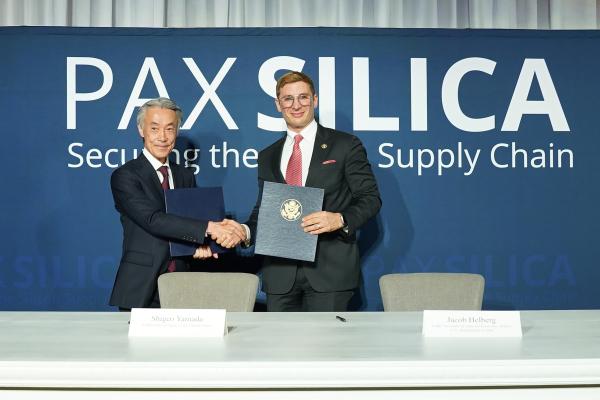
Please join Under Secretary Helberg and Hudson Executive Vice President Joel Scanlon for a discussion on the Pax Silicia initiative, America’s strategy to win the global AI race, and the new geopolitical imperatives of economic security and technology.
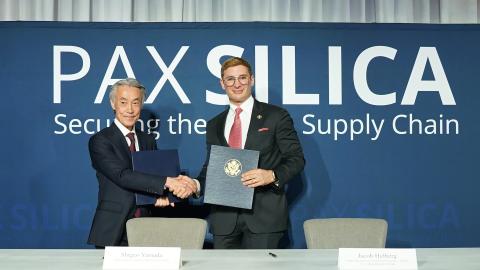
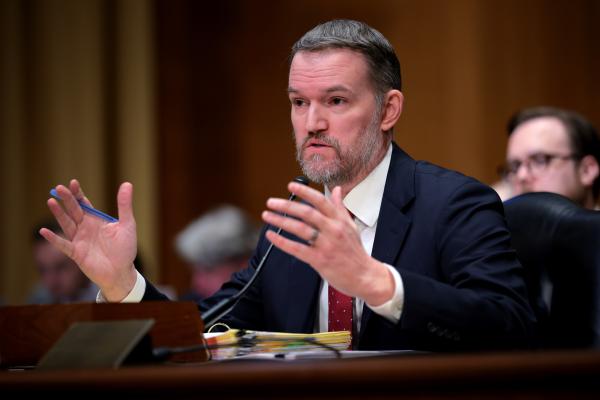
Please join Ambassador Greer for a fireside chat with Senior Fellow Peter Rough on the Trump administration’s first year back in office and what’s next for US trade policy.
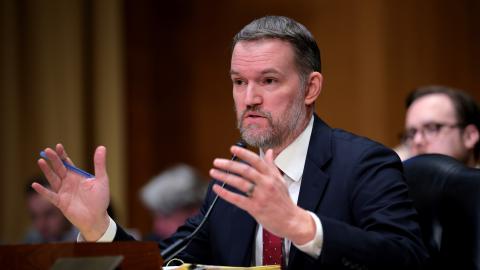

Join Hudson for a conversation with Assistant Secretary of War for Industrial Base Policy Michael Cadenazzi, who leads the DoW’s efforts to develop and maintain the US defense industrial base to secure critical national security supply chains.







